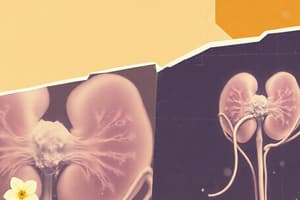Podcast
Questions and Answers
What is the main cause of diuresis?
What is the main cause of diuresis?
- Medications like diuretics (correct)
- Increased fluid intake
- Hormonal imbalance
- Kidney dysfunction
Which physiological response is primarily associated with diuresis?
Which physiological response is primarily associated with diuresis?
- Increased blood volume
- Decreased blood pressure
- Fluid retention
- Increased urine output (correct)
Which of the following factors may lead to diuresis?
Which of the following factors may lead to diuresis?
- High protein diet
- Hypothyroidism
- Excessive salt intake (correct)
- Reduced physical activity
Diuresis can occur as a response to which of the following conditions?
Diuresis can occur as a response to which of the following conditions?
Which mechanism does diuresis primarily affect?
Which mechanism does diuresis primarily affect?
Flashcards
What causes diuresis?
What causes diuresis?
Diuresis is the increased production of urine.
What is diuresis?
What is diuresis?
Increased urine output.
What does diuresis relate to?
What does diuresis relate to?
The kidneys' job regulating water balance.
Kidney function in diuresis?
Kidney function in diuresis?
Signup and view all the flashcards
Diuresis result
Diuresis result
Signup and view all the flashcards
Study Notes
Mechanisms of Diuresis
- Diuresis, the increased production of urine, is a complex process driven by various factors and mechanisms.
- It's fundamentally about regulating fluid balance in the body.
Factors influencing Diuresis
-
Fluid intake: Increased fluid intake directly leads to increased urine output. This is a simple reflection of the body's mechanisms for maintaining homeostasis.
-
Hormonal Regulation:
-
Antidiuretic Hormone (ADH): ADH, also known as vasopressin, plays a crucial role in water reabsorption in the kidneys. A decrease in ADH results in less water reabsorption, leading to increased urination.
-
Aldosterone: Aldosterone affects sodium reabsorption. Reduced aldosterone levels can lead to decreased sodium retention, thereby increasing urination, because less sodium means less water is also retained.
-
Renal Function:
-
Glomerular Filtration Rate (GFR): Changes in GFR are a primary determinant of urine volume. Increased GFR means more fluid is filtered and subsequently leads to increased urine output.
-
Tubular Reabsorption: The process through which the nephron reclaims important substances from the filtrate back into the bloodstream varies depending on the substances and their concentrations. Disruptions in this process can lead to diuresis due to altered water and electrolyte balances.
-
Tubular Secretion: The movement of substances from the bloodstream into the filtrate is another aspect of kidney function relevant to urine formation and diuresis. Improper function or regulation can influence the amounts of water or solutes ultimately excreted in the urine.
-
Medications: Certain medications, like diuretics, are specifically designed to increase urine output. This is a direct impact and is primarily therapeutic or used in management of conditions, such as hypertension
-
Dietary Factors: The sodium content in the diet affects water retention, thus influences diuresis, as well. High sodium intake can promote water retention, while low sodium intake can reduce it, thereby influencing urine output.
-
Pathological Conditions: Various medical conditions, such as diabetes insipidus and some types of kidney disease, disrupt normal kidney function and electrolyte balance. This disruption can cause increased urine output.
-
Stress: The physiological stress response can include the activation of certain hormones, impacting water and electrolye balances. This can lead to diuresis.
Types of Diuresis
-
Osmotic Diuresis: Occurs due to the presence of an osmotically active substance in the tubular fluid. This substance pulls water from the surrounding tissues into the tubule, increasing urine output. Examples include glucose in uncontrolled diabetes mellitus or mannitol, a substance used medicinally to increase urine output.
-
Water Diuresis: Arises from decreased ADH secretion, allowing more water to be excreted in the urine.
Importance of Maintaining Balance
- Correct fluid and electrolyte balance is crucial for maintaining optimal physiological function.
- Uncontrolled diuresis can lead to dehydration, electrolyte imbalance, and other serious health complications.
Studying That Suits You
Use AI to generate personalized quizzes and flashcards to suit your learning preferences.




